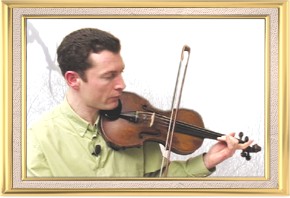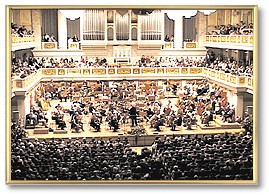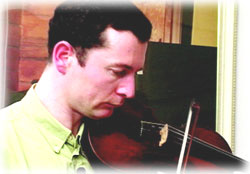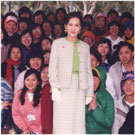|
|
|
|
|
|
|
|
||||
|
On
the Path |
||||||||||
|
Interviews
with Initiates |
Interview
with brother Jörg Schurig,
(originally in German)
Q: Dear Jörg, I’m very happy to welcome you. Could you please introduce yourself? Schurig: Yes, I’m also happy to be here. I am Jörg Schurig from Berlin, Germany, and I play the violin with the Berlin Symphony Orchestra. Q: When did you start playing the violin and why? Schurig: I started when I was a child, at the age of five, because a friend of mine had started to play the violin abut two or three months earlier, and I was so excited about his first recital that I absolutely had to learn to play the violin. Q: Later you studied both the violin and piano? Schurig: Yes, at a music college in Dresden. Q: And in 1989, you came to Berlin. Schurig: Right, I came to Berlin when the wall was torn down. That was a good moment. Q: I would also like to ask you which composer(s) you like most. Schurig: This is a good question. The composers I like most, we seldom play or do not play at all; I play in a concert orchestra, and we don’t play Bach, for example. I like Bach very much, more than anyone else. Of course, there are always pieces or symphonies by other composers to which I look forward very much, and I’m very happy when we play them once every few years. Q: And besides Bach, are there other composers that you like? Schurig:
Oh, yes, Mozart, of course. He had an incredible spirit that he
put into his music, one that you can feel again and again. His works
were never just random compositions, and as far as I know, he never
corrected what he wrote. And that’s very interesting, because
many other composers revised their pieces several times. But his
works were apparently created in a whole piece, out of one inspiration,
and he couldn’t wait to write them down. Also, he always had
too little time to write down the vastness that he had in his head
or in his being. That’s why he could accomplish so much in
such a short time and leave it all to us. Schurig: I like some pieces by Tschaikovsky very much and love to play his Pathetique Symphony, and Bruckner’s works are also very beautiful. Q: Anton Bruckner? Schurig: Yes, Anton Bruckner. For example, the fourth symphony of Bruckner is something I think everyone should listen to, because it’s so beautiful, and the end of that piece — the last three minutes — are like coming from above. It’s simply divine, very, very calm. Listen to it, if you can. It’s very, very beautiful.
Q: How did you turn to spirituality? How did that happen? Schurig: Yes, I can tell you. In order to learn an instrument, one needs to pay attention. One has to be quite diligent and have some discipline in order to learn the technique, to get into this musical world, because if you don’t have technique, you cannot go inside. After that, you should also have your own sound, which comes from your being, and it’s what you put into the music that you’re playing. For example, one pianist has a form of expression, strikes the keys in a different way than another pianist, so pianists are very different, and it’s always interesting to see when they come to us and they play a piano concerto by Mozart or Beethoven, how differently they play it, like with a soft, wonderful touch, or flowing, or hard. It’s the same with violinists, and I can speak better for them. Violinists need to find their own sound and that’s how they are. It’s amazing, but it’s also good that it’s like that. The sound of one violinist is warm, and the sound of another is a little more energetic, just like their character traits. So, the technique is only a way to express yourself, to put your being into the sound. Many musicians like to escape into the musical world and shut themselves up. They like to live in there and close their eyes when problems come up, or when problems exist in the outside world. It’s very easy then, but I think that’s not the way to live. And when you’re working on stage, you often come into situations where you see in yourself what other things are there. For me, this is a request to know more about myself and to find out what other things exist, and that was the beginning for me in searching further, and finally becoming a better human being. Because music can connect us, we can be ambassadors, and we can bring joy, but in order to change our environment and ourselves, we have to have a warmer heart, a more loving way to treat each other. And I think this is the best path that humanity can walk and this is also the reason that I came to our beloved Master Ching Hai. I believe that music was given to us in order to make our emotions finer and to make us happy for a short period of time. I think that it is very important to develop our conscience, to investigate our thoughts, how we treat each other, and to develop further so that our hearts become bigger. I believe that this is the most important thing that we can do in this world, and I experienced Master Ching Hai as Someone who gives so much goodness, so much love, that it simply makes you cry. That was a great experience. I hope that we, as disciples, can develop so that we can really share love, not just the feeling but also the state, and then we can be happy to have been here. Q: What attracted you most to Master and Her teachings? Schurig: I experienced the support of Her unconditional love. She really takes everyone into Her love, and She also has an incredible sense of humor, and She is very clear. It’s the brightness and freedom that She expresses that drew me to Her. Q: Did Master’s artistic creations also attract you to Her? Schurig: Not in the first place because I didn’t know about them when I first got to know Her. At that time I didn’t know that She wrote. Later, I learned that She wrote poems, before and maybe still now, and the paintings, or some of Her paintings, I saw later, and Her wonderful voice, I also heard later. Q: Do you like Her paintings? Schurig: I like Her paintings; I really like them very much. Q: And the songs that She has composed? Schurig: Oh yes, I just heard two of them today. They seem to be a little sad, in contrast to the way I know Her from the videos. They’re beautiful, beautiful. I like them. Q: If you met Master personally, what would you like to tell Her or ask Her? Schurig: We will see. Now I don’t know; there are many questions, but She has already answered some of them through other disciples. Questions like “Where do we come from?” and “Where do we go?” are not so urgent for me anymore.
Final words by Mr. Schurig: Everything
we do is a mirror of ourselves. When we go on stage, it’s
of course also a mirror of ourselves. According to our feelings
or the situation, we can experience nice or sometimes not so nice
things. Everyone who is on stage knows this. And then we see different
things that demand to be taken care of in order for us to go further.
It’s very good to love music, but I think there are also other
things that we as human beings have to do. That’s what I have
experienced. It’s important to experience a lot about yourself,
as much as possible, and to share good things and become a better
human being. To achieve this, we still have to learn. A conductor
recently said that there are great musicians, but not every musician
is a good human being. And every musician should think about this
because he has been given the tools in order to give and to share.
And when a person develops further, of course, he will be able to
share more.
|
|||||||||
|
|
||||||||||



